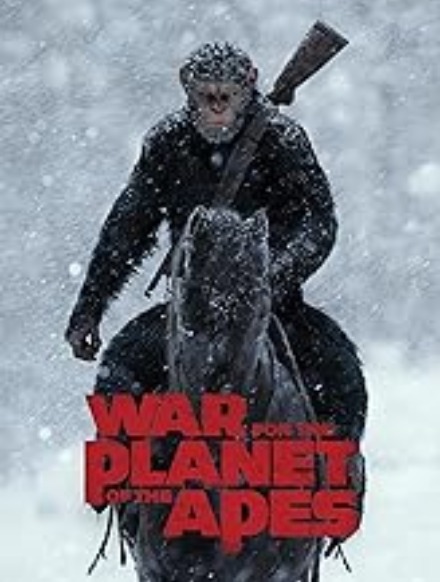

Freya Allan
20th Century Studios
145 Minutes
Directed by: Wes Ball
Starring: Owen Teague; Freya Allan
B
The more things change, the more they remain the same. In the first two films of the original Planet of the Apes pentalogy, astronauts Charlton Heston and, in the second movie, James Franciscus travel to the future and discover that the Earth is now ruled by intelligent, talking apes. Humans have devolved to mute savages. The last three movies took place in the 1970s present day or near future. Apes Roddy McDowell and Kim Hunter travel from the Heston/Franciscus future to the present day and trigger the events that lead to the apes’ eventual rise to power.
When the Planet of the Apes franchise rebooted in 2011, screenwriters Rick Jaffa and Amanda Silver started at the start. This time, instead of a time loop paradox explaining the talking apes, the cause is an experimental drug with some unintended consequences. Over the course of three
movies in six years, the drug gives apes the power of speech while rendering humans mute and sapping their intelligence. You might have thought that this reboot trilogy came to a logical conclusion in 2017, but never underestimate studio demand for a new blockbuster. The result is Kingdom of the Planet of the Apes. This film minimizes its social commentary in favor of entertaining action with great special effects.
Like the first two films in the original series, “Kingdom of the Planet of the Apes” takes place centuries in the future. Apes have gone their separate ways, forming various clans and small communities. Humans, whom the apes scornfully refer to as “echoes,” are scavenging savages. The teachings of Caesar, the apes’ leader in the earlier movies, have largely been forgotten, except for one phrase, “Apes together strong.” This call for unity has been corrupted by a warlord, calling himself Proxima Caesar (Kevin Durand). His troops have conquered and captured many of the clans and brought them into his seaside fortress. From there, he hopes to launch a final campaign against any remaining humans and ape opposition.
One of Proximus’ conquests is the peaceful Eagle Clan, so named because they raise and train golden eagles. They kill the clan leader and haul the clan’s survivors as prisoners back to his fortress. The clan leader’s son, Noa (Owen Teague), avoids capture and sets out to rescue his friends and remaining family. Along the way, he gains two traveling companions. The first is Raka (Peter Macon), an elderly ape who is the last survivor of the Order of Caesar. These apes are dedicated to preserving Caesar’s memory and teachings, which Raka imparts to Noa. The second survivor is Mae (Freya Allen), a human who can speak and is far more intelligent than any other human Noa has seen.
This film’s script was written by Josh Friedman, who most recently produced the TV series version of Snowpiercer. With a non-ape cast, this movie could have been a sword-and-sandal epic with peaceful denizens reluctantly taking up arms against a tyrant. There’s more to the story than that barebones description, however. The film tries to examine what would happen in the centuries after the apes ascended on the Earth. Some of the imagery is striking. The remnants of a great city (probably New York) are overgrown with ivy. Noa and Raka discover an observatory and marvel at seeing the distant sky. Apes now use bladed weapons, including a blow stick resembling a cattle prod. Overall, however, the production design overwhelms the science fiction concepts the movie tries to develop.
Kingdom of the Planet of the Apes succeeds because it’s a good action adventure with terrific special effects. The effects crew used motion capture techniques with human actors wired up with sensors to capture their movements. The resulting apes look incredibly lifelike in almost every scene and display the facial expressions that the story dictates. However, they don’t just walk around like McDowall and Hunter did half a century ago. They use all four limbs to run and climb with astonishing agility. That leads to some stunning climbing sequences, as when Noa and his friends scale a hundred-foot-high cliff to find an entrance to Proximus’ vault.
Despite some efforts at social relevance, Kingdom of the Planet of the Apes is summer popcorn entertainment with a twist. The heroes and villains aren’t people but apes that display some very human emotions. The characters sometimes conveniently act in the precise, improbable way needed to advance the story. But it’s all part of the fun. The movie’s ending provides an intriguing glimpse at the world beyond Proximus’s fortress and has a giant plot hook for a likely sequel. Judged on its own, however, “Kingdom” gives audiences what they need to go into a Marvel-less summer.
In this clip, Proximus Caesar addresses his followers:
Read other reviews of Kingdom of the Planet of the Apes:
Header Photo: "Riot Radio" by Arielle Calderon / Flickr / CC By / Cropped
Silver Screen Videos Banner Photos: pedrojperez / Morguefile; wintersixfour / Morguefile
Join Button: "Film Element" by Stockphotosforfree
Twitter Icon: "Twitter Icon" by Freepik
Facebook Icon: "Facebook Icon" by Freepik
LinkedIn Icon: "LinkedIn Icon" by Fathema Khanom / Freepik
Goodreads Icon: "Letter G Icon" by arnikahossain / Freepik
Freya Allen: "Actress Freya Allen" by Ron Raffety / Flickr / CC-BY SA 2.0 DEED
Certain images on this site appear courtesy of Amazon.com and other sponsors of Silver Screen Videos for the purpose of advertising products on those sites.
© 2024 Steven R. Silver. All rights reserved.





